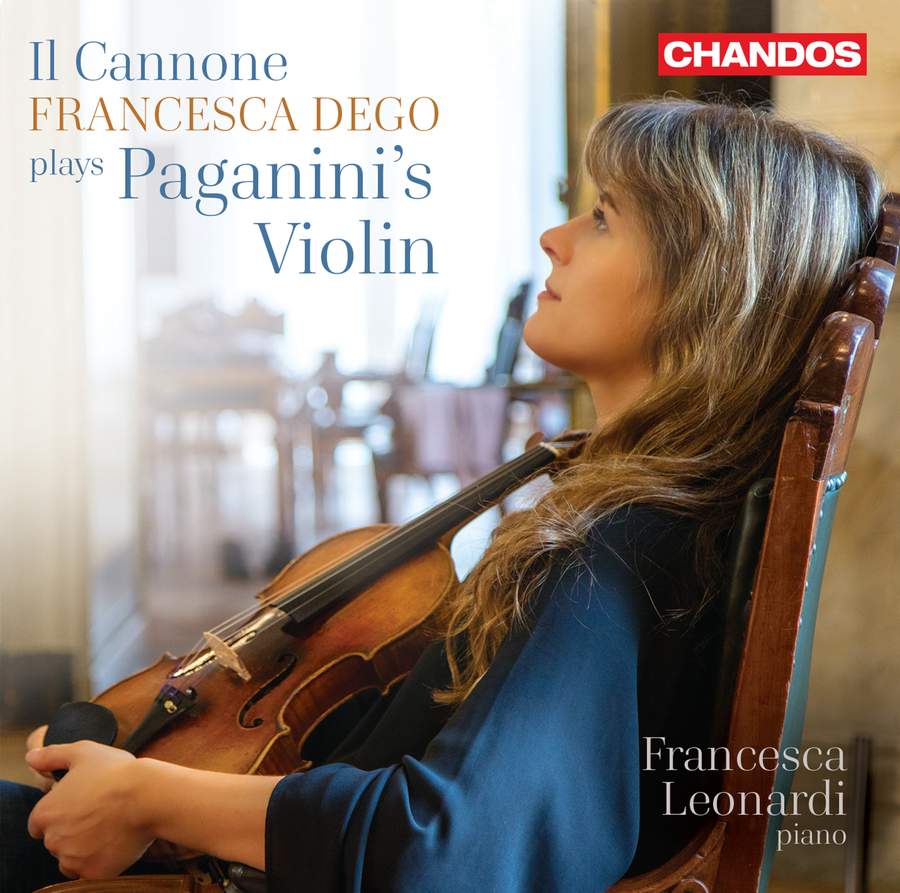Il Cannone - Francesca Dego plays Paganini's violin
View record and artist detailsRecord and Artist Details
Genre:
Chamber
Label: Chandos
Magazine Review Date: 04/2021
Media Format: CD or Download
Media Runtime: 64
Mastering:
DDD
Catalogue Number: CHAN20223

Tracks:
| Composition | Artist Credit |
|---|---|
| Concerto for Violin and Orchestra No. 2, Movement: Rondo à la clochette, 'La campanella' |
Nicolò Paganini, Composer
Francesca Dego, Violin Francesca Leonardi, Piano |
| Recitativo and Scherzo-Caprice |
Fritz Kreisler, Composer
Francesca Dego, Violin |
| (The) Red Violin Caprices |
John (Paul) Corigliano, Composer
Francesca Dego, Violin |
| Come d'autunno |
Carlo Boccadoro, Composer
Francesca Dego, Violin |
| Cantabile |
Nicolò Paganini, Composer
Francesca Dego, Violin Francesca Leonardi, Piano |
| Péchés de vieillesse, Book 9, '[Album pour piano, violon, violoncelle, harmonium et cor]', Movement: Un mot à Paganini élégie, D: violin and piano |
Gioachino Rossini, Composer
Francesca Dego, Violin Francesca Leonardi, Piano |
| A Paganini |
Alfred Schnittke, Composer
Francesca Dego, Violin |
| (3) Paganini Caprices |
Karol Szymanowski, Composer
Francesca Dego, Violin Francesca Leonardi, Piano |
Author: Charlotte Gardner
It’s a rare violinist who gets the chance to perform on Paganini’s favourite violin, the 1743 Guarneri del Gesù he nicknamed ‘Il Cannone’ (‘The Cannon’) on account of its power and sonority. Bequeathed to his birth city of Genoa in 1837, this important instrument now lives under lock and key, permission to perform on it granted but rarely, and permission to record on it granted more rarely still. Interestingly perhaps, those who have been granted the latter honour haven’t by any means been artists with Paganini-esque international reputations, but simply Paganini fans: Aldo Ferraresi; Paganini Competition winners Salvatore Accardo (1958) and Massimo Quarta (1991); American jazz violinist Regina Carter; and now also the young Italian violinist Francesca Dego, newly a Chandos exclusive artist, who in 2017 recorded the first of Paganini’s six violin concertos (DG, 2/18).
Dego’s Paganini-inspired programme is arguably less groundbreaking than her artist’s note claims, when Accardo equally presented a wide-ranging programme of Paganini-inspired rather than Paganini works, including his own Paganiniana. However, Dego’s is undeniably the first offering in decades from a classical artist, and in engineering terms alone it beats its predecessors hands down, making the most of both the Genoa town hall acoustic and the instrument’s famed warm, satiny lower registers. Pieces such as Kreisler’s Scherzo-Caprice meanwhile reveal some of the faintly astringent upper-register tone you also hear on the earlier ‘Cannone’ efforts, but Dego keeps it in check, which is impressive when you consider how little time she was granted with this violin to find its colours before pressing the record button. Her technique is also as red-hot and Paganini-ready as ever, as you hear especially over Corigliano’s fiendish The Red Violin Caprices. As for her new commission from Italian composer Carlo Boccadoro, Come d’autunno, in compositional terms this is unlikely to set the world on fire but it dovetails seamlessly into the rest of the programme with its combination of swift, rocking passagework and faintly creepy, angularly slow-leaping lyricism. Almost more striking is Boccadoro’s languorously trilling new piano accompaniment to Paganini’s Cantabile, poetically brought off by Francesca Leonardi, with equally lovely long lines from Dego.
If you’re keen to hear Paganini’s favourite plaything (or favourite four-stringed one, at any rate), performed with technical finesse and strong musicality while shown off by suitably polished engineering, then this amply does that job.
Discover the world's largest classical music catalogue with Presto Music.

Gramophone Digital Club
- Digital Edition
- Digital Archive
- Reviews Database
- Full website access
From £8.75 / month
Subscribe
Gramophone Full Club
- Print Edition
- Digital Edition
- Digital Archive
- Reviews Database
- Full website access
From £11.00 / month
Subscribe
If you are a library, university or other organisation that would be interested in an institutional subscription to Gramophone please click here for further information.




